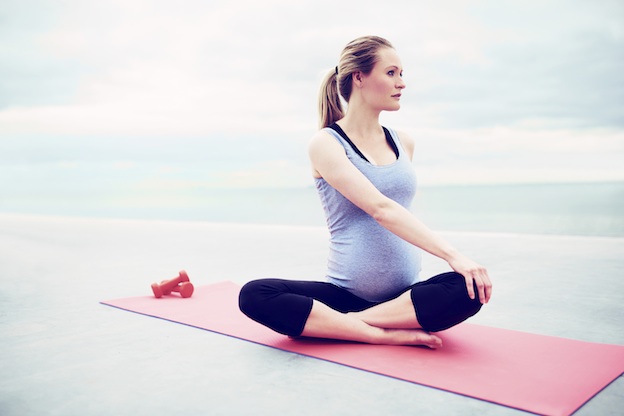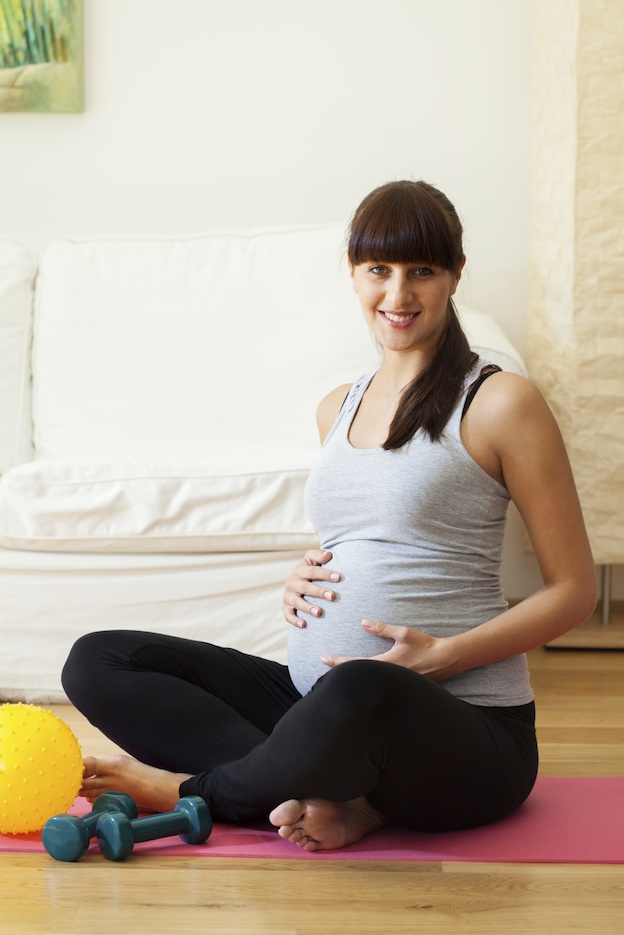SingaporeMotherhood | Parenting
January 2016
Pregnancy Weight Gain? Manage it with Exercise!

If I told you that varicose veins, swelling and stretch marks need not plague your pregnancy, would you believe me? What pregnant ladies often hear is that these are common pregnancy discomforts that they have to deal with, except for a lucky few with “good genes”. However, this is a misconception.
In a normal pregnancy, the main culprit for these “side effects” is pregnancy weight gain that is excessive or too rapid. Stretch marks, for example, occur when you gain weight too rapidly. This stretches the skin’s elastin fibers beyond their capacity, leaving white or silvery streaks across the skin’s surface. Varicose veins and edema (fluid retention) are also the result of the extra pressure your growing womb puts on your pelvic blood vessels.
[banner][/banner]
The bad news is that you can’t escape pregnancy weight gain; your baby needs maternal tissue and fat stores to support its growth. The good news? You can manage your pregnancy weight gain to minimise or even avoid its negative effects!
Tracking your Pregnancy Weight Gain
Weight gain during pregnancy is an accepted phenomenon, but it goes without saying that no woman likes to put on extra pounds. How much weight gain goes towards the baby’s growth and how much is just excessive?
According to Mrs Wong Boh Boi, Assistant Director (Clinical) of Thomson ParentCraft Centre, Thomson Medical Centre, “Most expectant mothers gain a total of one to two kg during the first trimester. The second trimester sees the largest rate of weight gain in terms of maternal tissue and fat stores, and your weight gain should range from four to five kg. In the last trimester, you should expect a total weight gain of four to six kg.” In other words, the total healthy weight gain during pregnancy should not exceed 13 to 14 kg.
It’s beneficial to also keep an eye on the rate at which you gain weight. As Dr Kelly Loi, Obstetrician & Gynaecologist, Mount Elizabeth Hospital, explains, “It helps to get an idea of how the mother is eating and her nutritional status. Both excessive weight gain or suboptimal weight gain are equally undesirable. Excessive weight gain may increase the risk of having a large-for-date baby, while inadequate weight gain can lead to growth restriction and a small baby.”
How to Exercise during your Pregnancy
One of the most effective ways you can manage pregnancy weight gain is by engaging in regular physical exercise during pregnancy. Not only will exercise encourage blood circulation and reduce water retention, it will also help you stay within the recommended weight gain range, therefore alleviating the burden the extra weight places on your joints, skin and blood vessels.
But as your pregnancy progresses, the extra weight and shifting centre of gravity may make exercise movements uncomfortable or less achievable. Do you continue with your regular exercise regime? Dr Anthony Siow, Obstetrician and Gynaecologist, Gleneagles Hospital Singapore, recommends that exercise be modified with each trimester as the womb enlarges.
“With an enlarged womb, usually after the 16-week mark, the weight of the womb can press on the main blood vessels around your spine when you are lying down. This reduces blood flow back to your heart and causes a drop in blood pressure and fainting spells. Hence exercises that require you to lie flat on your back should be avoided.” Such exercises include bicycles, leg raises and hip rolls.
The First Trimester
Your body now: Pregnancy hormones trigger a chain of changes in your body, which cause you to experience telltale symptoms such as nausea and aversion to certain smells. Fatigue is extremely common. Your digestive system also slows down.
What’s safe: In the early stages of pregnancy, you’re able to continue with your pre-pregnancy fitness routine. Running, swimming and other cardio exercises are great exercises for pregnancy and are easily picked up even if you seldom exercise (30-minute sessions for three to five times a week). It’s best to avoid contact sports such as rugby, ice hockey and soccer, as well as activities with a risk of falling, such as horse riding and rock climbing.
What exercise does for you:
• Improves your pregnancy moods
• Helps maintain bone density
• Decreases your risk of gestational diabetes
If you feel exhausted: Some moms find that with all the first trimester symptoms, they can barely manage exercise. This is actually pretty common, so just do light exercise whenever you feel up to it. Regular exercise during the first trimester helps alleviate those symptoms as well.
The Second Trimester
Your body now: You’ll find that you have more energy than before. Now that the hormonal upheaval in the first trimester has eased off, the second trimester is a great time to work out.
What’s safe: In addition to regular cardio, work on developing back and abdominal strength with standing core exercises that don’t disrupt your balance. Gladys Leong, certified pre- and post-natal fitness trainer, and co-owner of Hercules Fitness Gym recommends that pregnant ladies walk more, do mobility exercises, and pelvic enhancing exercises (e.g. bridges) to aid in delivery. But avoid exercises that involve abrupt stopping movements such as tennis, CrossFit and plyometrics as these may lead to injury.
What exercise does for you:
• Reduces back pain
• Reduces weight gain
• Maintains muscle tone, posture, cardio fitness and abdominal strength
• Increases energy levels
• Improves digestion
• Enhances maternal well-being and helps ward off pre-baby blues
If you feel exhausted: During pregnancy our bodies don’t tolerate the same levels of exertion as well as before pregnancy. To still get an effective workout, try the following: Alternate days between strength training and cardio, break a cardio workout at the gym into three segments of different activities (e.g. use the treadmill, stationary bike and elliptical for 15 minutes each) or break your workout into two sessions in one day.
The Third Trimester
Your body now: Mobility is limited and you find that you tire easily. You also experience breathlessness because your growing uterus pushes against your lungs and diaphragm. Relaxin levels increase to prepare for labour, so avoid overstretching or straining yourself.
What’s safe: “As the womb gets even larger in the third trimester, exercise that involves skipping, heavy lunges, and squats should be avoided,” Dr Siow advises. Lower the demands on your body to a 30-minute moderate workout four days per week to maintain physical and mental health.
What exercise does for you:
• Increases self-esteem
• Improves posture
• Improves sleep and energy levels
• Gives you a shorter and smoother labour
If you feel exhausted: Scale back to three days per week and shorter durations.
Maintaining healthy pregnancy weight through regular exercise reduces the likelihood of pregnancy symptoms, and contributes positively to your baby’s health. It has been found that children of mothers who gain excessive weight during pregnancy are more likely to become overweight by the age of seven. So stay active during your pregnancy and eat healthily. You’ll love your post-pregnancy body, and getting back in shape after birth will also be easier!
All content from this article, including images, cannot be reproduced without credits or written permission from SingaporeMotherhood.
Follow us on Facebook, Instagram, and Telegram for the latest article and promotion updates.







